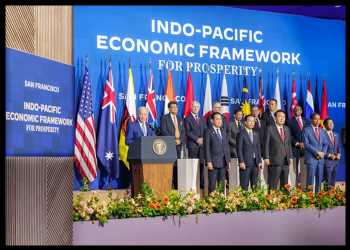The Indo-Pacific Economic Framework for Prosperity (IPEF) member nations have signed a landmark Supply Chain Agreement.
This is among a number of key deals agreed upon by 14 IPEF nations during the third Ministerial Meeting held in San Francisco, California.
IPEF partners – the United States, Australia, Brunei, Fiji, India, Indonesia, Japan, South Korea, Malaysia, New Zealand, the Philippines, Singapore, Thailand, and Viet Nam – represent 40 percent of global GDP and 28 percent of global goods and services trade.
In record time, the United States and its IPEF partners have negotiated first-of-their-kind agreements to help achieve the goals of advancing workers’ rights, facilitating high-standard trade and investment, and tackling pressing issues facing these countries, in particular, vulnerable supply chains; clean energy transitions; and corruption, outging APEC chair President Joe Biden said.
The IPEF Supply Chain Agreement will help partners promote diversification and resiliency in their supply chains, better identify supply chain vulnerabilities, establish an emergency communications channel to respond to disruptions arising from crises such as the Covid-19 pandemic, and promote high labor standards that respect workers across regional supply chains.
The final texts of the agreements will be prepared after domestic consultations and legal reviews by IPEF member countries.
The meeing also signed The Clean Economy Agreement and The Fair Economy Agreement.
The Clean Economy Agreement will help catalyze the economic opportunities arising from IPEF partners’ transitions to cleaner economies and, through cooperative work programs and the mobilization of public and private financing, will drive inclusive investment in the region and greater collaboration with the private sector.
The Fair Economy Agreement will enhance IPEF partners’ efforts to prevent and combat corruption, including bribery, and support efforts to improve tax transparency and tax administration, which will strengthen the investment climate in the region and ensure the benefits of economic growth are broadly shared.
Each of the agreements includes novel provisions to protect labor rights.
These provisions include a tri-partite Labor Rights Advisory Board to promote labor rights in supply chains and to help prevent the exploitation of migrant workers.
It has also been agreed to establish a ministerial-level IPEF Council.
The United States announced a new IPEF Project Preparation Facility run by the U.S. Trade and Development Agency.
The IPEF Critical Minerals Dialogue will support U.S. expansion and development of its full critical mineral supply chain.
Launched in Tokyo in May 2022, the Indo-Pacific Economic Framework for Prosperity establishes high-standard commitments to create a stronger, fairer, more resilient economy for families, workers, and businesses in the United States and in the Indo-Pacific region.
Source: Read Full Article
-
RAF veterans training Chinese military will face prosecution warns Grant Shapps
-
‘It could be the next Notre Dame’: Inside the crumbling Palace of Westminster
-
‘Can’t win, can you?’ Shapps on the spot as he’s confronted with dire election prospect
-
Biden Administration Announces Plan To Reduce Homelessness 25% By 2025
-
POLL: Should Boris Johnson be given a cabinet position under new PM?

